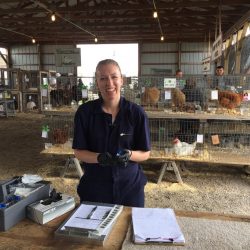By Kellie Rizzolo
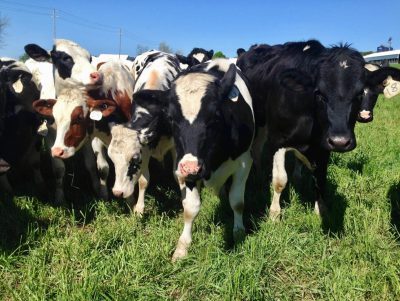
I had been struggling all summer with the topic I wanted to address for my Food Systems Fellowship blog post because, after spending my summer working for the Michigan Milk Producers Association (MMPA), I have so much to say. However, last night at the grocery store, I overheard a mother on the phone saying she only bought almond “milk” for her children because it “doesn’t have any antibiotics in it.” She wasn’t wrong. Almonds don’t get antibiotics when they get sick. But, what concerned me was her implication that cow milk in the grocery store does, and that assumption makes me extremely sad. Why? Because every single day, an unrecognized ally—someone who I aspire to be—is protecting this woman’s food to ensure it is safe, free of antibiotics, nutritious, and humanely raised. These allies are missing dinner with their own families because a cow got sick late in the evening and needed immediate treatment. They had to leave their child’s baseball game early because they were needed for a C-section or to make a decision if an animal was healthy enough to provide milk—not only for the animal’s wellbeing, but for the safety of our food. They’re the person you don’t realize is constantly looking out for your family’s wellbeing: your local food animal veterinarian.
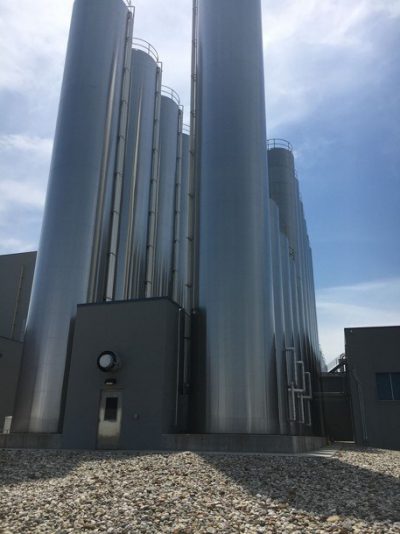
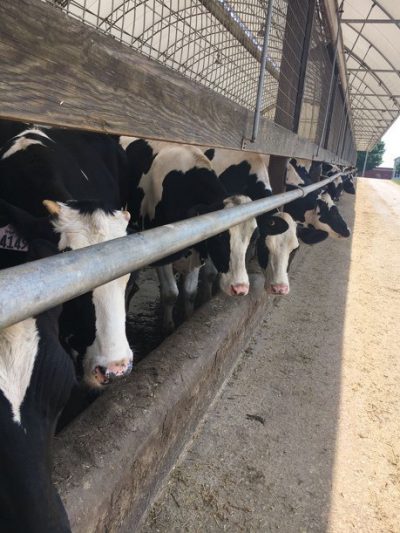
There are numerous ways production animal vets protect the food supply and human health, but during my summer with MMPA, I’ve seen first-hand the critical role veterinarians play in the milk supply at the farm level. The veterinarian is considered part of the farm team, and while they are the person responsible for surgeries, pregnancy checks, and diagnoses, they play a larger role as a consultant in every aspect of herd health. Veterinarians provide input for housing management changes to decrease respiratory disease and incidence of mastitis. They teach udder prep techniques during milking to prevent infections and illness. They can assist with nutrition decisions, design vaccination protocols, and ensure animals are being treated well on the farm. They work with the farmers to design standard operating procedures for incidents the farm is likely to encounter (e.g. metritis, mastitis, retained placenta, moving a down cow, etc.) to ensure the safety of the animals and employees, the proper handling of animals, and the appropriate withdrawal times on drugs to prevent residues. Farmers are the first line of defense in protecting our food, and veterinarians are the ones responsible for educating them on the “why” and “how,” and making sure they follow correct protocols in regard to preserving animal and human health.
So, why does it upset me when I hear someone say there are antibiotics in milk? Because I am going to work my entire life preventing that from happening, much like your local veterinarians, farmers, and milk inspectors currently do, and because the judicious use of antibiotics is an incredible tool to save lives. When you get a sinus infection or strep throat, you go to a doctor, who likely prescribes you an antibiotic. Veterinarians are doctors. They use antibiotics to treat sick or injured animals. If left untreated, the cow may be in pain, the infection or illness could spread to another cow, her milk will severely decrease the quality of that farm’s total milk, and she could even die. That’s why vets work with farmers on treatment protocols for these common illnesses, so that employees can identify a sick cow right away and provide treatment following the veterinarian’s protocol to prevent her milk from being sold to you. The farm, their cooperative, their milk hauler, and the dairy plant all have checks to make sure our milk is not from a group of sick animals and that it doesn’t have antibiotics in it.
Every time milk is picked up on a farm, a sample is taken from each tank. When the milk truck arrives at the dairy plant, the load is tested for antibiotics. If it tests positive, the milk is dumped; it does not go into the silos with confirmed antibiotic-free milk. The milk that caused the entire load to be positive is traced back to the guilty farm, which is responsible for paying for that whole truckload of ruined milk. That’s why when a farm is suspicious an accident happened, they can call their veterinarian or cooperative representative to come to the farm and test the milk for antibiotics. It’s also why veterinarians are responsible for educating farm employees on dosage and withdrawal times to prevent these accidents from occurring.
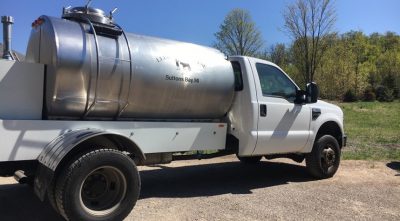
No, almond milk doesn’t have antibiotics in it. But, neither does cow milk. Do you know what cow milk does naturally have that almond milk doesn’t? Minimal processing, no added sugar, and a significant amount of nine essential nutrients including protein, calcium, and vitamins A and D. Sure, almond milk can be fortified with some of these nutrients, but it is far from being nutritionally equivalent to real milk, which brings me to my point.
Have you noticed how I’ve said “our” milk this entire article? That’s because veterinarians and farmers have families, too. They shop at the same grocery stores you do. They eat the same foods as you. They want to feed their families healthy, safe food, just like you do. If they wouldn’t feed it to their own families, veterinarians and farmers wouldn’t feed it to yours. Our milk is safe. Our cheese is safe. Our yogurt, ice cream, chocolate, and all other dairy products at the grocery store are safe. If someone tries to scare you into believing your dairy products are unsafe, please remember that you have doctors out there dedicating their lives to protecting your food.
Let’s raise a glass of ice-cold milk for our unsung protectors and dairy farmers across the nation. #MilkMeansMore



